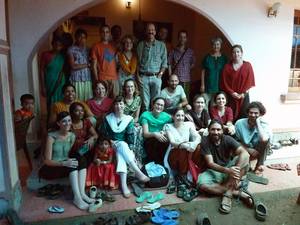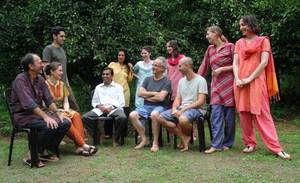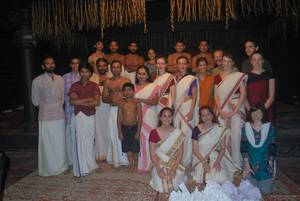Kudiyattam: Living Sanskrit Theater in the Kerala Tradition
Heike Oberlin (Moser) & David Shulman: Kudiyattam: Living Sanskrit Theater in the Kerala Tradition, gefördert von der German-Israeli Foundation for Scientific Research and Development (GIF) für 3 Jahre plus ein Jahr Verlängerung (2013-2016).
Im Projekt entstandene Filme:
- Kutiyattam. Indian theater from the first millennium. Ein Film von Mira Keßler (https://vimeo.com/155116226)
- The best snack ever. Ein Film von Ophira Gamliel (https://youtu.be/5cWplZt1v44)
Artikel in ATTEMPTO 39, 2015, S. 32-37: Indisches Theater aus dem vorigen Jahrtausend / Indian theater from the first millennium
Classical Sanskrit theater has survived as a living performance tradition, continuous with the medieval past, only in one form, the Kudiyattam (“Combined Performance”) tradition of Kerala in the south-west of the sub-continent. This complex, still vibrant, yet endangered artistic tradition— recognized by Unesco as a “masterpiece of the oral and intangible heritage of humanity”—is in urgent need of scholarly study and state-of-the-art documentation. Traditional performances of Kudiyattam plays range from roughly thirty to well over a hundred hours (each is usually a single act from one of the classical Sanskrit dramas), with each subsequent day or night of performance adding indispensable elements to the emergent artistic whole. Only two major academic centers in the world are engaged in serious, long-term study of Kudiyattam—the University of Tuebingen, where PD Dr. Heike Oberlin (Moser), the leading expert on this tradition, teaches and pursues research, and the Hebrew University of Jerusalem, where Prof. David Shulman is now concentrating on the cultural history of Kerala and its classical artistic forms together with several advanced students. The profound complexity of this tradition as well as its intimate links to very ancient Indian sources and to specifically south Indian ritual and artistic genres require the active cooperation of a team of highly trained scholars. Tuebingen and Jerusalem thus seek to combine their efforts in a large-scale project, historically informed and philologically precise, with a wide cultural-historical scope, which is likely to transform our understanding of classical Indian drama and poetics. The project includes detailed analysis of the primary performance texts in the existing repertoire (hundreds of hours of recorded performance, published and unpublished stage-manuals, including palmleaf-manuscripts), publication of a series of monographs on various aspects of the Kudiyattam corpus, workshops and a major international conference in Tuebingen and/or Jerusalem, and two research expeditions to complete documentation of the repertoire before it disappears.
Vom 1.-19.8.2010, 13.8.-3.9.2011 und 29.7.-27.8.2012 haben David Shulman (Hebrew University) und Heike Oberlin (Moser) gemeinsam mit der Kutiyattam-Schule »Nepathya« (Margi Madhu) und in Zusammenarbeit mit Killimangalam Vasudevan Namboodiripad und Kalamandalam Rama Chakyar intensive, jeweils drei- bis vierwöchige Kutiyattam-Workshops in Kerala / Südindien mit Studierenden aus Israel, den USA und Tübingen geleitet. Zusätzlich zu allabendlichen Kutiyattam-Aufführungen wird Sanskrit- und Malayalam-Sprachunterricht angeboten, weiter finden zahlreiche Unterrichtseinheiten über das indische Theater in Theorie und Praxis statt.
Die Workshops werden in dem gemeinsam von David Shulman und Heike Oberlin (Moser) getragenen und seitens der German-Israeli Foundation for Scientific Research and Development (GIF) finanzierten Projekt Kudiyattam: Living Sanskrit Theater in the Kerala Tradition in den Jahren 2013-2015 fortgesetzt und durch Tagungen in Tübingen und Jerusalem sowie eine internationale Konferenz in Kerala ergänzt.

Flyer 2012
Flyer 2011
http://www.thehindu.com/arts/dance/article600227.ece?css=print


Artikel in The Hindu, 21.10.2010: Bowled over by Koodiyattam. Heike Moser, researcher and the first foreigner to have had her arengetram in Kerala's mimetic theatre form.
